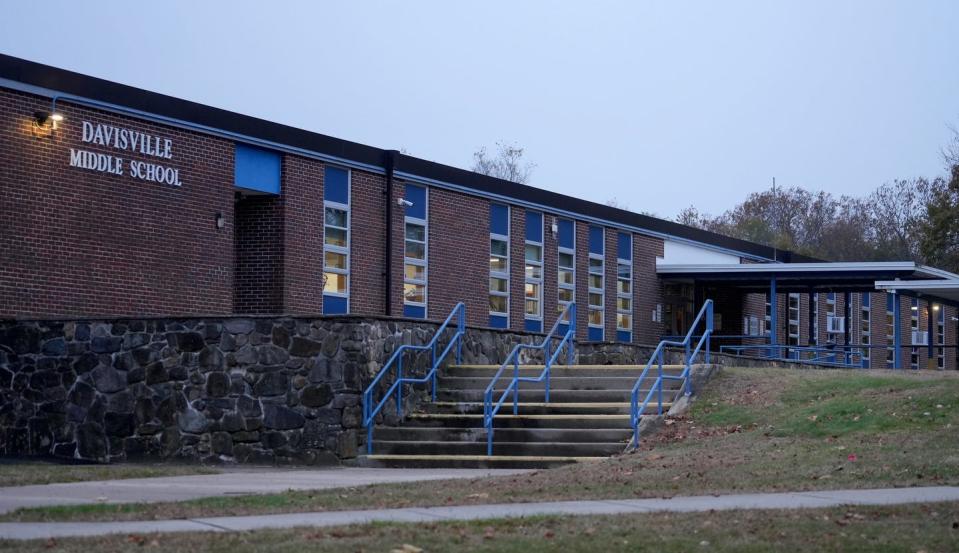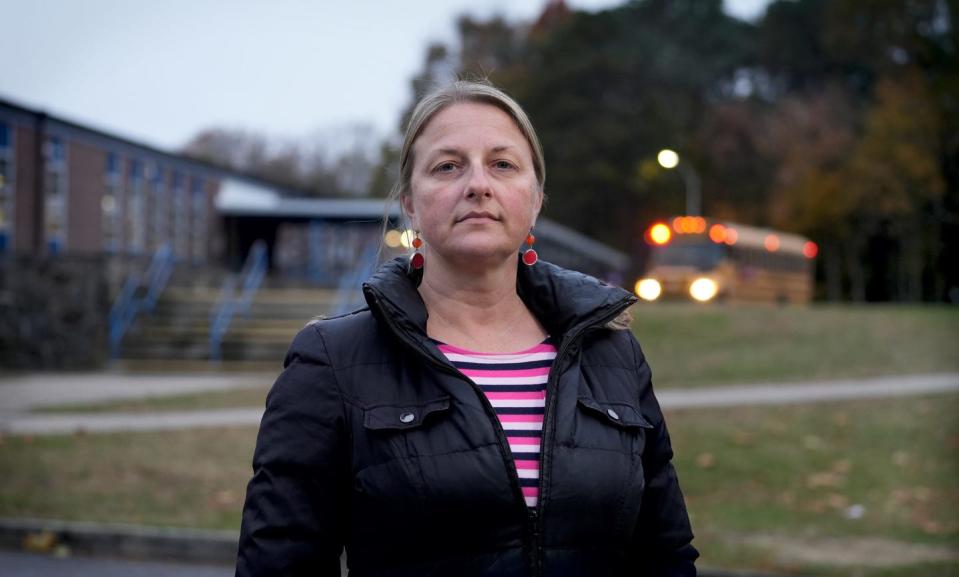Why did North Kingstown school bond go down in flames?
NORTH KINGSTOWN – When voters here took an electoral wrecking ball to the town's big construction plans last week, even the indoor pickleball courts weren't left standing.
Jolting an otherwise sleepy off-year 2023 Rhode Island election night, North Kingstown residents torpedoed a combined $247.5 million in public borrowing for three construction projects headlined by a new middle school, reversing a winning run for construction bonds across the state.
It was one of two local borrowing questions denied at the ballot box this year − the other was a North Smithfield police bond − and the only school bond to go down.
And it wasn't close.

The proposed $222.5 million in borrowing to build a middle school and new public safety complex was rejected on one ballot line by 24 points.
And a second question to OK $25 million for a recreation center (where the pickleball courts would have been) went down by 30 points.
Turnout in special elections is traditionally low, and in North Kingstown – which is not in the 1st District, where there was a congressional election – the bond questions were the only things on the ballot.
But they caught the attention of town voters, driving a 34% local turnout that easily exceeded the roughly 19% turnout in communities with elections.
The defeat of the North Kingstown bonds cut against the grain of not only this year's school bonds, but the success of ballot measures in recent years, which have been aided by support from labor unions and the building trades.
BuildRI, a coalition of contractors and construction trade unions, has led the charge for school borrowing across the state, and its executive director is also North Kingstown Town Council president, leading some to assume approval of the bonds was a safe bet.
So what happened?
School construction planning in the town has gone anything but smoothly.
And rising interest rates combined with inflation are making the politics of local construction projects more challenging.
But more than anything, the North Kingstown referendums were unique in this year's local ballot questions for featuring an organized opposition, a key to taxpayer revolt campaigns that residents of other communities might take note of.
The opponents
Megan Reilly is a mother of four and former teacher of Spanish who now works as a substitute in North Kingstown schools.
She's never run for office, doesn't plan to and "wanted nothing to do with politics" until North Kingstown's school building plans morphed, grew and then over the summer were rolled into the larger borrowing package with a new police/fire station.

"I was curious about behind-the-scenes stuff, like how the district is run, where our money is going and what's going on in our schools," she said. "And then, I just didn't think it was right to sit on that information. And I thought, well, I have time and I have the information. I might as well share it with the public."
To reach the public, Reilly turned to Facebook, where she started an "NKMS Project" group raising critical questions about the bonds that would eventually grow into organized opposition that included residents Ed Renehan and Frank Sullivan.
They saw the scale of borrowing proposed − nearly a quarter billion dollars in a town of 28,000 people − as a potential red flag to voters and branded it the "Megabond."
In lawn signs that sprouted in front yards across town, the "megabond" took the illustrated form of an enormous great white shark with gaping mouth opening to swallow a fishing boat.
"Save NK Property Taxes," the text below the shark read.
Political Scene: How much state money has gone to minority-owned businesses? The Journal investigates.
"I think that it was absolutely kind of like a perfect storm of bad timing with putting three projects out there − two bond votes when we're like at a 20-, 22-year high for interest rates," Reilly said. "The housing market is really unstable. ... I mean, we had a lot of senior citizens come out and vote yesterday who normally wouldn't. But ... people are really fearful that they wouldn't be able to afford this stuff."
In the last several years and in the wake of the COVID pandemic, local parents groups have sprung up to advocate for a greater public say in curriculum and to counter what they see as teaching of progressive social values. In many cases, these groups have overlap with fiscal conservatives and opposition to tax increases.
That doesn't appear to have been a major factor in this election.
Reilly said there was some parental organizing in North Kingstown, most of it in response to the coach Aaron Thomas scandal, but that had mostly died down by the time the school construction issues came up.
Unique situation
Opponents and proponents of the North Kingstown ballot questions both say that unique local circumstances in the way the bonds were conceived make it hard to draw lessons for other communities.
The public school district administration had been riven by management turnover and the turmoil of the Aaron Thomas scandal as it worked to solve long-delayed school facility decisions.
Should the town's two middle schools be repaired or replaced in kind, or be merged into a single school? If there is going to be a new unified middle school, where should it go?
School and town officials wanted to answer these questions before the opportunity to qualify for state school funding incentives created by the last statewide school bond expire next summer. But they appeared to still be debating the best approach over the summer, even as the bond referendum was put on the ballot.
One early plan would have put the school on the Quidnessett Elementary property, but it was scrapped due to concerns about wetlands and space constraints.
Instead, the town's two middle schools would be merged in a new building at the site of the current Davisville Middle School. It would be one of the largest middle schools in the state and cost an estimated $130 million. (The middle school project would have made up the bulk of the $167.5 million for "school purposes" in the $222.5 million bond, with the remaining $55 million for the public safety complex.)
More: Husband of soon-to-be RI Democratic Party chair marked by controversies. What we know.
Located in the town's northern end, the Davisville location would mean longer travel times for students in the southern half of town. Davisville Middle School was a polling place Tuesday, and support for the bond was 1 percentage point higher there than at the more southerly Beechwood Senior Center, but still only 38%.
Finally, the decision to combine borrowing for the new middle school with funding for a new police/fire complex was seen by some as a cynical tactic to bundle a good project with a bad one.
And even though it was put on its own ballot line, the $25 million recreation center project featuring nine pickleball courts was seen as fiscal brine in the wound.
The gross spending on all three projects was estimated to result in an $811 increase in annual taxes for a home assessed at $450,000.
BuildRI stays mum
North Kingstown Town Council President Greg Mancini is executive director of BuildRI, the nonprofit construction trades coalition that has backed school bonds across the state. Sensing the potential appearance of a conflict, he recused himself from deliberations on the ballot questions.
And he said BuildRI decided not to campaign for the construction bonds in North Kingstown this year as it was doing for ballot questions in other towns to avoid an appearance of impropriety.
Political support for the North Kingstown projects would instead come from the local firefighters, police and teachers unions.
Although he regrets the outcome, Mancini last week said the high turnout is a good sign for North Kingstown's civic vitality.
So what went wrong?
"I'm a big proponent of, if you're going to make significant change, keep it as simple as possible − and I don't think we did that," he told Political Scene "We changed plans midstream. We had one site, we changed plans midstream and then went for one middle school. And I think that caused anxiety in our community."
Contrary to suggestions that the town was trying to sneak the bonds through in an off-year special election, Mancini said he would have preferred a regular election year, but the timing was forced by the deadline for state incentives.
He noted that North Kingstown was the only community where there was organized opposition to local bonds.
In many communities, proposals for new schools have led to questions about why public schools can't keep facilities functioning the way private schools do and are often tearing down to build new.
Mancini said government austerity measures in and around the Great Recession created deferred maintenance problems that are only now being reckoned with.
On whether BuildRI's involvement in the campaign would have made a difference, Mancini said he doesn't know and doesn't think it would be appropriate to speculate.
"The citizens of North Kingstown participated in our democracy on Tuesday in record numbers for a special election," he wrote in an email. "So I sincerely hope that no organization, BuildRI or any other, would have been able to modify that outcome because that result is what the people clearly wanted."
The National Education Association North Kingstown, North Kingstown International Brotherhood of Police Officers Local 473 and North Kingstown Firefighters Association Local 1651 contributed a combined $21,000 to support the bonds, according to an Oct. 31 filing with the state Board of Elections. That money paid for a website, door-hangers, T-shirts and Facebook ads, among other things.
North Kingstown School Committee Chair Erin Earle wrote that it "isn't easy to guess why voters made their choices."
"But one noticeable difference is that many districts only put forward the schools this year," she wrote in an email. "We will need to go out again − and soon. Investing more into the two aging buildings is not fiscally responsible. We will do a couple of things differently. Most importantly, I will recommend to the School Committee to ask the Town Council to only put forward the school."
Town Manager Ralph Mollis said the town needs to "gather public input" to learn more about what voters want and to "eliminate the misinformation" before making a new building proposal.
Looking ahead, many in town expect another vote, maybe even in the spring, on separate funding for the police/fire building, which Reilly said would likely have passed easily had it not been attached to the school project.
The outlook for a new middle school − at whatever location is chosen − is more murky.
And prospects for new municipal indoor pickleball courts in North Kingstown are even bleaker.
This article originally appeared on The Providence Journal: Why did North Kingstown school bond go down in flames?

